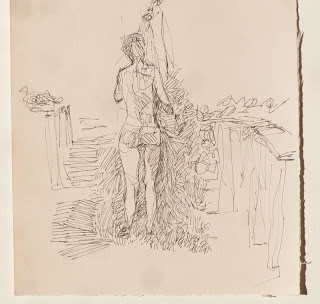This is the power of the signifier: that no matter which side I realize that another side thinks I'm stupid, or evil, or bound for hell, or shrugs the judgment of indifference - and that if I took up those opposing causes and became the UberIdealist, the UberFundamentalist, that those same reactions would still obtain. The signifier holds out the promise of being declared righteous which is summarily removed [through sleight of hand] at the same moment as it's position is accepted.
Someone may say, "you write about this signifier a lot and I don't understand what a signifier is - or I don't see what the big deal is." I can only remark from my own experience that people live their lives under banners, as it were: as Christians (who only selectively read the Bible and that in a kind of pre-interpreted way); as Patriots (who are anti-government and yet endorse government sponsored violence); as Rebels (who endorse conformity with society and the group); as FreeMarketeers(who endorse socialized arrangements for corporations). These are examples. Lacan says that the signifier swallows up the subject, from the inside out as it were; and you may have noticed this where a person talks about the Government, for instance, in great detail as to its faults, especially in group settings which are wonderfully inflating for the ego (but they cannot talk about themselves with any of the same clarity or objectivity - though, like the Government they also spend too much, abuse those under them, welch on their obligations, and seemingly make up rules arbitrarily to suit their disposition).
The rule of the signifier is one reason perhaps that Jesus admonished "judge not or you'll be judged" or James in his letter opines "by the same judgment you use, you'll be judged".
Anyway, I find it difficult to write about myself. To speak about myself. And most people would say the same. Perhaps it is embarrassing. Perhaps it reeks of egoism (though in context only shows how fragile the ego is feared to be). Lacan says that the end of therapy is when a person can speak about themselves to another person - that is, that I, for instance, could speak about myself owning my own history as a series of choices I made, rather than events that happened to me. It helps to be able to speak this narrative to someone who can hear it. Sometimes even friends are incapable of hearing this - in so far as they also cannot speak of themselves.
I am trying to find a way to carry on. Jung points out that what we see in our lives, how we judge the world around us, is more the projection of our unconscious desires and conflicts and an accurate assessment of reality. This was brought home to me be an article in the Onion: http://www.theonion.com/articles/father-teaches-son-how-to-fly-into-rage-over-compl,33487/?ref=auto
Father teaches son how to fly into rage over completely inconseqeuntial bullshit.
The part I find compelling in this article is the mention of interpreting slow drivers and slow people in the check out line as personal affronts.
I find this liberating.
My problem is an object relations problem: I want to please people and have them approve of me, even as I want nothing to do with them, as I anticipate their rejection from the get go, as it were. In doing so, I have no idea what I want - I cannot even say and it seems a moral imposition - there is a bone in my throat at the thought of saying what it is that I want.
I speak and words fall out of my mouth onto the ground
I cry out that I need help
and cannot say what that help might be
Where is your faith, he asked
I had it just a bit ago
Here are some tokens of appreciation though
victory march
flag on a marble arch
I'm exhausted. I enjoy meeting people. I feel out of place. When I was very young, playing musical chairs, I often didn't make it to the chair when the music stopped. I feel that way - that I'm frozen, unable to move. I didn't understand the rules of the game I was compelled to play. I did as I was told. And then I was yelled at for just standing there. Then I was yelled at for being in the way.
I don't know what chance or opportunity is out there. It's important that I make some money. When I say that people's eyes glaze over. They have no idea. I'm 50 and needing a job, if only to interact socially with people. I used to have this job scoring essays and math tests back in Durham. Its virtue was its intellectual challenge. People say that reading these tests is boring - but I feel the contrary: I find myself connected to these kids - even as they make errors or fail to develop ideas. Sometimes they would show great feeling and ingenuity. Sometimes the test question would be written poorly, so poorly that bizarre alternative answers would be admissible. These questions were usually thrown out when they didn't yield predictable results or were predictably misunderstood.
Atlanta doesn't seem to have work like that.
























































